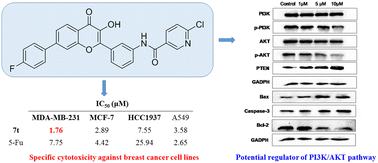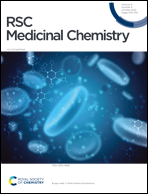Synthesis and in vitro anticancer evaluation of novel flavonoid-based amide derivatives as regulators of the PI3K/AKT signal pathway for TNBC treatment†
Abstract
Aberrant activation of the PI3K/AKT pathway is considered in many malignant tumors and plays a crucial role in mediating malignancy progression, metastasis, and chemoresistance. Consequently, development of PI3K/AKT pathway targeted drugs is currently an attractive research field for tumor treatment. In this study, twenty-six flavonoid-based amide derivatives were synthesized and evaluated for their antiproliferation effects against seven cancer cell lines, including MDA-MB-231, MCF-7, HCC1937, A549, HepG2, GTL-16 and HeLa. Among them, compound 7t possessed the best specific cytotoxicity against triple negative breast cancer MDA-MB-231 cells with an IC50 value of 1.76 ± 0.91 μM and also presented inhibitory ability on clonal-formation, migration and invasion of MDA-MB-231 cells. Further cell-based mechanistic studies demonstrated that compound 7t caused cell cycle arrest of MDA-MB-231 cells at the G0/G1 phase and induced apoptosis. Meanwhile, the western blot assay revealed that compound 7t could down-regulate the expression of p-PI3K, p-AKT, and Bcl-2 and up-regulate the production of PTEN, Bax, and caspase-3. Molecular docking also showed a possible binding mode of 7t with PI3Kα. Together, compound 7t was eligible as a potential TNBC therapeutic candidate for further development.



 Please wait while we load your content...
Please wait while we load your content...